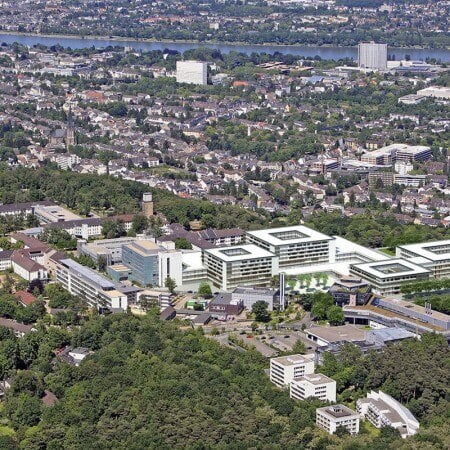The overall prevalence of the hepatitis infection in Germany is low. However, the burden of the hepatitis virus may still be high among certain subpopulations. In 2016, the German government developed the national strategy for the elimination of the hepatitis virus. Meeting the international goals and requirements of WHO, German healthcare professionals have elaborated a number of preventive and therapeutic measures. These include treatment of fulminant hepatitis forms in the specialized hospitals, outpatient treatment of chronic hepatitis B and C, liver transplantation and symptomatic medications. In addition, eligible patients can participate in clinical trials. Treatment of hepatitis in Germany is available for both German residents and international patients.
Content
- Treatment of fulminant hepatitis forms
- Treatment of chronic forms of hepatitis B
- Treatment of chronic forms of hepatitis C
- Last-line therapy – liver transplantation
- Leading hospitals for treatment of hepatitis in Germany and cost of treatment
- Treatment of hepatitis in Germany with Booking Health
Treatment of fulminant hepatitis forms
The term "fulminant" means that the liver damage occurs suddenly and progresses quickly, becoming a life-threatening condition. Admission to the hospital and urgent therapeutic measures are required. As for the clinical manifestations, patients usually have encephalopathy (cerebral edema and coma in the most severe cases), renal failure, and coagulopathies.
Fulminant forms are typical for infection with:
- Hepatitis B (up to 3% of all infected people), especially in coinfection with hepatitis virus D (up to 50% of cases).
- Hepatitis E, when diagnosed in pregnant women in the third trimester.
- Hepatitis A, when diagnosed in people with preexisting liver pathology.
Patients with hepatitis C rarely develop fulminant hepatitis forms.
Patients stay in an intensive care unit and receive an aggressive therapy of complications. These include sorbents and hemodialysis for renal failure, drug infusions for the correction of blood coagulations, diuretics and drugs to prevent cerebral edema, detoxification therapy, etc. It has been proven that comprehensive and aggressive treatment of hepatitis complications leads to better outcomes.
The emergency liver transplantation is the best working option in this clinical situation. Actually, it is highly doubtful that an adult patient will survive without receiving a donor liver. Children have better chances due to significant regenerative potential of the liver, but still benefit from undergoing liver transplant. If the causative agent is hepatitis B, then oral nucleoside or nucleotide analogs are administered. Nucleoside or nucleotide analogs can’t cure the infection by themselves, but improve the survival rates.
Treatment of chronic forms of hepatitis B
The chronicity of hepatitis B reaches 10%, which is the significant figure for an infectious pathology. What is also important, liver cirrhosis and hepatocellular carcinoma may develop against the background of chronic hepatitis B. For example, risk of developing liver cirrhosis is about 5-15%. Thus, therapeutic measures are aimed at maintaining liver function, preventing cirrhotic changes and malignization. The therapy is life-long.
The first group of drugs includes oral antiviral agents. Entecavir and tenofovir are the most efficient and beneficial of all antiviral medications, as they:
- Suppress the hepatitis B virus significantly
- Rarely cause drug resistance, even in prolonged intake
- Rarely cause side effects, side effects are mild
- Have simple dosing schedule – just 1 pill daily
- Do not require meticulous medical monitoring
Interferon injections are the second option that is available for people with chronic hepatitis. The pegylated interferon alfa-2b is similar to the human interferon that protects the body against infections. Additional interferon injections boost the immunity so that it fights the hepatitis virus better. Doctors offer this treatment option to young people who do not want to have long-term therapy or to women who are planning pregnancy in the nearest future. However, interferons should be withdrawn during pregnancy.
HIV coinfection is often diagnosed in patients with hepatitis B. In order to avoid the risk of HIV drug resistance, such patients should not receive monotherapy with tenofovir or combination therapy that includes tenofovir with emtricitabine or lamivudine.
In all cases, monitoring of the treatment efficacy is required. These include performing Fibroscan, assessing ALT and AST blood levels, assessing the viral load.
Treatment of chronic forms of hepatitis C
The management of chronic hepatitis C depends significantly on the viral genotype and liver state. When choosing the therapeutic regimen, doctors consider the following:
- HCV genotype and HCV RNA
- Aspartate aminotransferase to platelet ratio index (APRI)
- Ultrasound scan
- Fibroscan, transient elastography
- Liver enzymes, liver function
Depending on the diagnostic data received, one of the four therapeutic regimens is used:
- Patients with hepatitis genotypes 1, 2, 3, 4, 5, 6 without signs of cirrhosis or with compensated cirrhosis should receive sofosbuvir or velpatasvir 1 tablet daily. The course of treatment is 12 weeks.
- Patients with hepatitis genotypes 1, 2, 3, 4, 5, 6 without signs of cirrhosis or with compensated cirrhosis AND patients with hepatitis genotype 3 without signs of cirrhosis may also receive sofosbuvir 1 tablet daily in combination with daclatasvir 1 tablet daily. The course of treatment is 12 weeks.
- Patients with hepatitis genotype 3 with compensated cirrhosis may receive sofosbuvir 1 tablet daily in combination with daclatasvir 1 tablet daily. The course of treatment in this case is 24 weeks.
- Patients with hepatitis genotypes 1 and 4 without signs of cirrhosis or with compensated cirrhosis may also receive sofosbuvir or ledipasvir 1 tablet daily. The course of treatment is 12 weeks.
If the cirrhosis is decompensated, doctors should consider prolonged treatment courses, i.e. 24 weeks in each case. It should also be noted that the above mentioned medications are contraindicated in case of breastfeeding or pregnancy. Women of the reproductive age should pay attention to choosing the reliable birth control method.
Last-line therapy – liver transplantation
The hepatitis virus B and C is the most widespread causative agent of liver cirrhosis and end-stage liver failure. In such cases, liver transplantation is indicated. Liver transplantation is total or partial removal of the diseased liver and int replacement with healthy donor liver. Up to 50% of all donor liver recipients in the USA are people with hepatitis virus. Hepatitis B accounts for 5% of liver transplant cases in the USA, although the percentage is higher in Asian countries.
Donor liver may be harvested from brain dead organ donors, cardiac death organ donors, and living donors. The first two donor types are people who need constant life-sustaining medical support (e.g. after injury, massive stroke, etc.) and are no longer able to live outside the healthcare facility. Living donors are usually parents or relatives who undergo partial liver resection in order to provide their child with a healthy liver. It is extremely hard to find a compatible donor of the corresponding age, and the liver of the adult donor is too big for a child. Thus, a partial resection becomes the best decision. However, living-donor liver transplant in adults is also possible.
First, the donor liver is removed and prepared. After that an open surgery in the recipient starts. A surgeon opens the abdomen and evaluates it for abnormalities (e.g. undiagnosed tumors). Vital structures of the liver are isolated, i.e. the hepatic artery, the portal vein, the inferior vena cava, and the common bile duct. The cirrhotic patient’s liver is removed and a new healthy liver is transplanted. Venous and arterial blood flow, as well as biliary drainage are re-established. After the surgery it is necessary to take medications with immunosuppressive effect, so that the donor liver is not rejected by the patient’s body.
Leading hospitals for treatment of hepatitis in Germany and cost of treatment
Those people with hepatitis who want to undergo treatment in Germany, have many healthcare facilities to choose from. If you want to see less patients around, you may choose a private praxis. If you want to undergo the multidisciplinary treatment or become a participant of clinical trials, it is better to select the university hospital:
- University Hospital Duesseldorf, Department of Gastroenterology, Hepatology and Infectology
- University Hospital of Ludwig Maximilian University of Munich, Department of Gastroenterology and Hepatology
- University Hospital Ulm, Department of Gastroenterology and Hepatology
- University Hospital Heidelberg, Department of Gastroenterology, Hepatology and Infectology
- University Hospital Bonn, Department of Gastroenterology, Hepatology, Nephrology, Infectology, Endocrinology and Diabetology
Prices for treatment in Germany are regulated by the DRG-system (diagnosis related groups). Due to this, treatment in Germany is affordable for the international patients. Approximate prices for the hepatitis infection treatment programs are as follows:
- Making diagnosis and cost of treatment of hepatitis A – from 1,141 EUR
- Making diagnosis and cost of treatment of hepatitis B – from 1,193 EUR
- Making diagnosis and cost of treatment of hepatitis C – from 1,283 EUR
- Making diagnosis and cost of treatment of hepatitis D – from 1,140 EUR
- Making diagnosis and cost of treatment of hepatitis E – from 1,296 EUR
The price may vary depending on the healthcare facility, age of a patient, presence of concomitant diseases, etc.
Treatment of hepatitis in Germany with Booking Health
The most simple and cost-effective way of undergoing treatment in Germany for residents of other countries is using services of Booking Health. Booking Health is the international medical tourism operator that is registered in Germany. Working according to the German legislation, Booking Health considers all peculiarities of treating patients with hepatitis infection in this country. The company offers:
- Selecting the most suitable healthcare facility for treatment in Germany
- Communicating with the hospital, making the appointment (without being on the waiting list)
- Preparing and explaining the medical program that meets patient’s needs
- Keeping under control prices for the medical services, excluding additional fees for international patients (saving up to 50%)
- Communicating with the hospital after the program completion, translating medical records
- Help in buying necessary medications for the maintaining therapy
- Arrangement of additional diagnostic procedures or treatment, if necessary
- Choosing plane tickets, taking care about accommodation and transfer, interpreter
- Round-the-clock help of medical coordinator
Fill out the "Send request" form, and wait for the call of the medical advisor or medical coordinator for discussing further steps of treatment in Germany.
Authors: Dr. Vadim Zhiliuk, Dr. Sergey Pashchenko



















